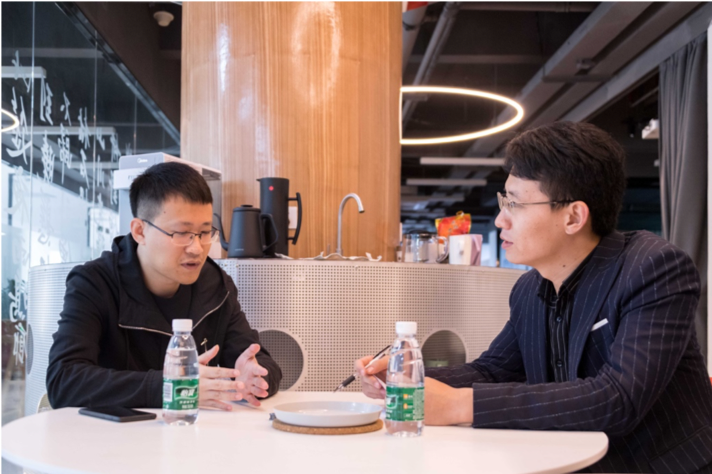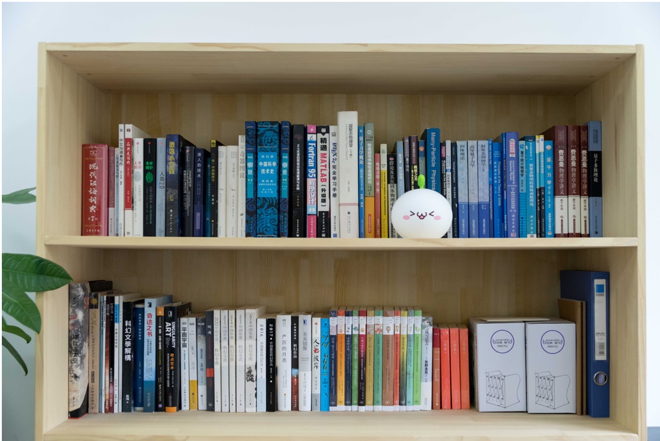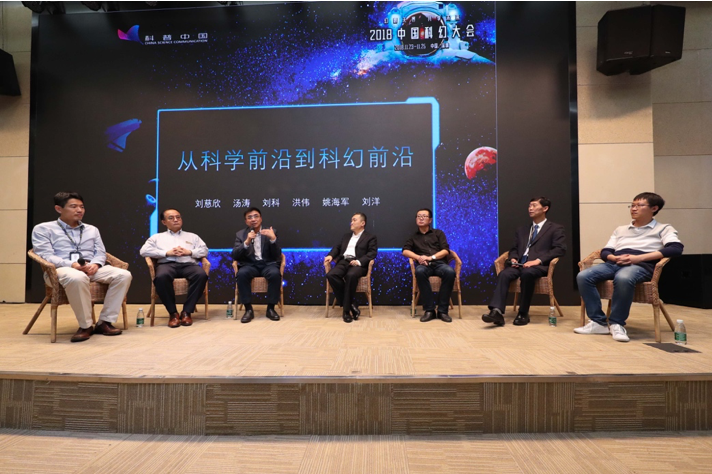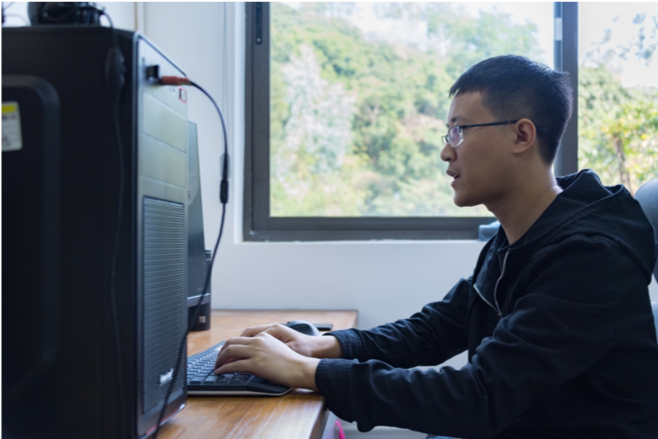Some people say that he is a writer, someone that turned their hobby into a career and created his ideal kingdom with words.
Others say he is a professor who combined cutting-edge scientific principles with a creative mind to create his sci-fi world.
He has found his own unique way to be a purveyor of prose!
Dr. Liu Yang, who got his Ph.D. in condensed matter physics from Beijing Normal University, was born in 1986 and has long been studying strongly correlated electronic systems while teaching physics classes. In 2018, he joined the Humanities Center of Southern University of Science and Technology (SUSTech) where he started to teach academic writing, creative writing and science fiction related teaching & writing.
 Liu Yang (left)
Liu Yang (left)
Novel and unique writing techniques lead to a different creative world in science fiction
Liu Yang’s creative style integrates cutting-edge scientific principles into his literary creations, reflecting the science fiction reality in an inimitable manner. His novel writing style is refreshing to readers, and the plot circles have been a point of much discussion in literary circles.
Liu Yang has published worked in renowned science fiction publications such as Science Fiction World and New Science Fiction. His writings have been reprinted in literary publications like Beijing Literature and Fiction Monthly, with further works translated into English for international literature periodicals such as Clarkesworld and Pathlight.
His short story collections Perfect Doomsday and Hive have been published, along with his novel Mars Orphan. His works have won many awards, including the Light Year Award at the 4th Chinese Science Fiction Awards, the Silver Medal for Best Novella at the 9th Nebula Awards for Global Chinese Science Fiction, the 2019 JD Literature Award for Science and Technology, the 1st Science Fiction Star River Award and a medal for Creativity in Science Fiction Films at the 8th Nebula Awards from Global Chinese Science Fiction Awards.

His hobbies turned him from a science-fiction fan to a science-fiction writer
Liu Yang has always been one that has enjoyed reading, even as a child. He recalled the path that led him to start writing science fiction. He spoke about his reading of Science Fiction World magazine in primary school, which developed his interest in science fiction. They were core pieces of science fiction that were truly innovative at the time, books like Babylon Tower, Exotic Land and Collapse. Ever since then, Liu Yang has wanted to create his own unique ideas. His Chinese teacher wanted every student to write a daily diary of at least 100 words, so Liu Yang would write childish science fiction stories, in the style of a serial fairy tale.
After the college entrance examination, Liu Yang applied to study physics at major universities across mainland China, a result of the influence of science fiction on his life. During his postgraduate studies, he accidentally signed up for Professor Wu Yan’s science fiction writing course. With Wu Yan as the professor giving mainland China’s only university class on science fiction, he had a substantial influence on Liu Yang. He took the opportunity to start writing novels and publish short stories in Science Fiction World, giving him further confidence.
Liu Yang said that his postgraduate studies were full of data processing and programming, and with large-scale calculations taking a long time to get results, he had plenty of time to read and write. Throughout his studies, he was able to publish two collections of short stories and was able to maintain his passion after graduation.
He said that most of his stories came from small ideas that popped out while reading books or documents, so they were essentially related to physics. His story entitled Hive came from his study of graphene and the ultra-high-speed migration speed of the electrons. Train to the Moon came from a test program written for debugging programming software. The debugging program was the inspiration of creating a train that would accelerate to the point of making its passengers weightless. This single idea ultimately turned into a central idea of more than thirty thousand words.
Liu Yang’s most popular work is titled Pythagorean 2.013 – set as a What-If problem. The central premise asks if somewhere in the universe has different laws of physics from those here on Earth, how would their stories be different? Such a setting is still unique, and his readers are very fond of it. When Pythagorean 2.013 was published, it was reprinted on Weibo where it was read millions of time in one day. His mobile phone nearly died with notifications on Weibo continuing to push to his mobile phone. The novel was later translated into English and published in American sci-fi magazine Clarkesworld.
He is most satisfied with his work called Single Hole Diffraction. It was first published in the ZUI Found where it was later reprinted in several mainstream literary magazines such as Beijing Literature and Fiction Monthly. It also caused some discussion among the literary community. “I think it’s mainly because this novel embodies the reality of the way in a unique way of science fiction, which is what I have always wanted in my later works.”
He believes that creating a good science fiction work requires not only certain scientific literacy and a fulsome imagination but also the ability to form its own logic and system. For science fiction fans, the success or failure of a novel depends largely on the author’s ability to make sense of it, which is not an easy task. If done correctly, the sci-fi world can inspire readers with incredible fantasy and infinite fascination.

What is the relationship between science fiction and science? In November 2018, at the Science and Technology Conference SUSTech Forum, the participating scientists and sci-fi writers discussed the relationship between science and science fiction. In Liu Yang’s opinion, the field of science is becoming more and more detailed, and the scientific vision of most science fiction writers is far from complete. So he believes that science is leading the development of science fiction.
Liu Yang also has his own views for the relationship between science fiction and the reality. On the one hand, science fiction originates from reality, and reflects reality from the perspective of transcendence, which conveys some postmodernist meanings. Science fiction reflects problems by creating a sci-fi scene instead of using a straight-narrative style. The extracting of knowledge in “Mars Orphans” reflects the real environment to a certain extent. On the other hand, science fiction has a foreseeable function, predicting the consequences of development in modern science and technology, which conveys a sense of vigilance. Science fictions created by the trigger of artificial intelligence show this significance.

Imagination is the fusion of logic and human thinking.
Liu Yang believes that creating a good science fiction work requires not only certain scientific literacy and a fulsome imagination but also the ability to form its own logic and system. For science fiction fans, the success or failure of a novel depends largely on the author’s ability to make sense of it, which is not an easy task. If done correctly, the sci-fi world can inspire readers with incredible fantasy and infinite fascination.
Using his own novel, The Orphan of Mars, as an example of fantastical events, ordinary high school students discover the true purpose behind aliens manipulating these strange events. While many first view cars flying through the air and fires raging through the sky as part of a traditional alien invasion theme, Liu Yang still strikes out with a boldness found at the micro-physical level. The Orphan of Mars will sound be published by The People’s Literature Publishing House, and a new novel is now being worked on.
Since he joined SUSTech in July 2018, SUSTech’s “new Shenzhen speed” has left a deep impression on Liu Yang just like on other people. “SUSTech have a profound environment of science fiction creation for the developing speed of this young university itself is like a science fiction.” Compared to other traditional universities, the students of this university where he taught can learn more different experiences. When it comes to the SUSTech students, rich imagination, active thinking mindset and high-level scientific research abilities will be the key words. Liu Yang recalled that once he asked in class, “What’s happening when an aircraft first arrived at the back of a planet and then found a tractor?” Instead of silence, the students were enthusiastic about the question and gave different answers, such as “the aircraft flew into the parallel time actually”, “the aircraft flew into the virtual world with a bug” or “human beings have secretly invented the moment transfer”.
At SUSTech, Liu Yang teaches Science Fiction Creation and Writing & Communication. The first course focuses on literary writing, while the latter examines methods of applied and academic writing. He believes that science fiction effectively melds science and literature together, as a fundamental understanding of scientific principles is required as well as the ability to communicate people’s deepest feelings. STEM students should look at sci-fi novels to learn from and understand them, as it teaches them logical thinking, creativity, and structural organization skills. At SUSTech, Liu Yang teaches Science Fiction Creation and Writing & Communication. In the early stage of the course, Liu Yang will give a task to the students, and then students will exchange their works for mutual evaluation after creating the results according to the task. He will give suggestions for students to submit the revised works according to the characteristics of different magazines. Last semester, one of his students, Wang Zhenzhen’s science fiction The Deminer, was accepted by Science Fiction World, and was selected as the 2018 China Science Fiction of the year together with Liu Yang’s convection.
SUSTech is actively exploring new modes of liberal education. Combining his own work experience with the academic atmosphere of SUSTech, Liu Yang believes that the idea of integrating the liberal education and scientific education is very feasible. In the next semester, Liu Yang will continue to teach “Science Fiction Creation”. He is looking forward to discovering potential students in the science fiction creation. At present, Liu Yang has already started the creation of a new long science fiction novel. The outline has been revised several versions. He candidly said that he is still not satisfied enough and is still adjusting. A new novel is now being worked on, he candidly said that he is not satisfied enough and is still adjusting.
Proofread ByRachel Wu
Photo ByZhong Changqi